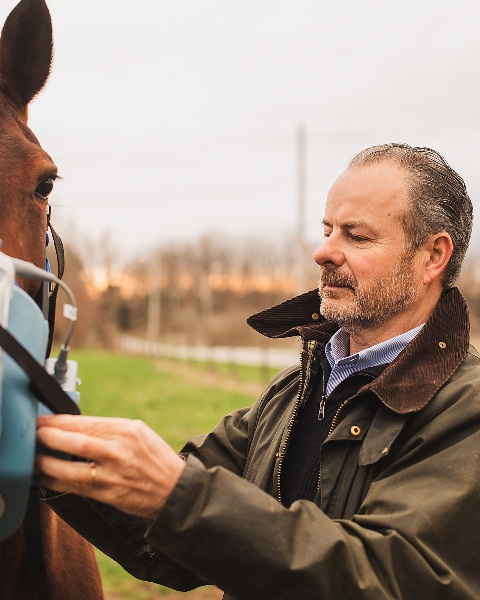Equine
Omega-3 Polyunsaturated Fatty Acids Supplementation Modulates Airway Response to Dust Exposure in Thoroughbred Racehorses
Friday, June 7, 2024
8:00am - 8:30am CT
Location: MCC Auditorium 1
CE: 0.5

Laurent Couetil, DVM, PhD, DACVIM-LAIM (he/him/his)
Professor
Purdue University
West Lafayette, Indiana, United States
Research Report Presenter(s)
Abstract: Background- When combined with low dust diets, omega-3 polyunsaturated fatty acid (Omega-3) supplementation can reduce neutrophil proportions in the bronchoalveolar lavage fluid (BAL) of horses with asthma and healthy horses. It is unknown if Omega-3 supplementation is effective without concurrent dust mitigation.Hypothesis/Objectives- Dietary supplementation with fish oil rich in Omega-3 will lower the proportion of neutrophils in the BAL of horses fed a conventional diet including hay.Animals- Clinically healthy racing Thoroughbreds (Nf83) housed at 4 US racetracks.Methods- In this double-masked controlled trial, horses were randomly assigned to receive daily fish oil (50 ml) or placebo (corn oil; 50 ml) for 4 weeks. Exposures of particulate matter smaller than 10 µm (PM10) were measured, plasma Omega-3 concentrations were assayed and BAL was collected at baseline and after 4 weeks of supplementation. The IACUC approved all procedures. The effects of supplementation and PM10 exposure on BAL neutrophil proportions were evaluated using a generalized linear models. Significance was set at p < 0.05. Results- BAL neutrophils decreased from 8.9+/-1.2% to 3.9+/-0.9% (mean+/-s.e.m.) in horses given fish oil compared to placebo (5.9+/-1.1% to 6.1+/-1.1%; p=0.014). After controlling for state and PM10 exposure, BAL neutrophils decreased as plasma Omega-3 docosahexaenoic acid increased (p=0.0005). Conversely, BAL neutrophils increased as plasma arachidonic acid increased (p < 0.0001). Conclusions and clinical importance- Supplementation with fish oil rich in Omega-3 reduces BAL neutrophil proportions in clinically healthy racehorses independent of dust exposure. Increasing Omega-3 intake might help mitigate neutrophilic asthma in horses fed hay.

